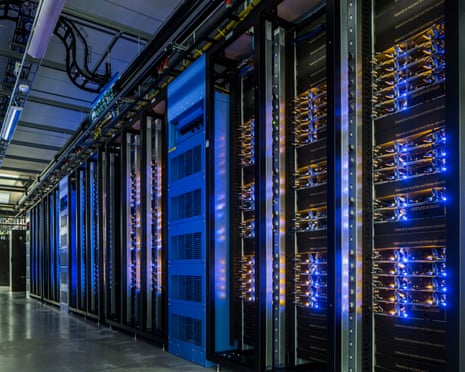UK’s New AI Data Centre Poised to Emit Five Times More Than Birmingham Airport
A substantial new datacentre aimed at meeting the increasing demand for artificial intelligence in Britain may result in more greenhouse gas emissions than five international airports combined. The Elsham datacentre, located in Lincolnshire, is projected to cost £10 billion, with its 15 energy-intensive computer warehouses expected to emit five times the carbon dioxide produced by Birmingham airport, taking into account both take-offs and landings.
A planning application for this facility, situated nine miles east of Scunthorpe, was submitted last month, with a public consultation period closing in three weeks. Documents indicate that the datacentre is estimated to utilize 3.7 billion kWh of energy, which could lead to annual CO2 emissions of 857,254 tonnes when operating at full capacity. This estimation is based on the current energy source mix powering the National Grid. Additionally, the facility is anticipated to generate significant excess heat, prompting proposals for glasshouses capable of producing over 10 tonnes of tomatoes daily.
Many global tech companies are finding it challenging to achieve their carbon-reduction targets. Research conducted by the Öko-Institut in Germany predicts that carbon dioxide emissions from AI datacentres will rise to six times the levels observed in 2023 by the year 2030. Greenpeace has urged that an equivalent capacity for renewable energy should be integrated into national grids parallel to the construction of new datacentres.
Recently, Microsoft acknowledged that, five years after its commitment to becoming zero carbon by 2030, its total emissions had climbed by 23% due to factors including the expansion of AI. This week, Meta announced a 20-year partnership with a nuclear power plant in Illinois, while Amazon and Google are also making investments in nuclear energy to fuel their competitive edge in AI.
Datacentres play a crucial role in training AI models and facilitating AI-powered searches, which are now routinely available to billions of users through platforms like Google and Meta, requiring four to five times more computing power than before, according to estimates. Climate experts suggest that AI could assist in combating global warming by optimizing the efficiency of power grids or hastening the development of new zero-carbon technologies.
Martha Dark, co-executive director of Foxglove—a London-based nonprofit advocating for a fairer tech landscape—asserted that the Elsham planning application puts two essential UK government missions at odds. “The prime minister has touted datacentres supporting generative AI as a remedy to revive Britain’s struggling economy while also pledging to eliminate air pollution and achieve net zero emissions by 2050,” she stated. “It’s decision time: does the government prefer an economic strategy that benefits Britain, or one that favors tech giants like Amazon, Google, and Meta?”
According to planning documents, “Elsham Tech Park Ltd will strive to acquire green power for the facility where feasible.” The developers believe that CO2 emissions could be lower than the projected 850,000 tonnes annually if the National Grid adopts greener sources by the time the datacentre becomes operational in 2029. However, on-site renewable energy solutions have been deemed impractical by the developer. Utilizing biomass energy would require the daily delivery of 100 large truckloads of wood chips. Wind energy would necessitate installing 10,000 20-meter wind turbines, while powering the site solely with photovoltaic panels would demand an area five times larger than the Glastonbury festival site.
A government representative stated that it is “mindful of the power demands that will accompany AI development” and will utilize “responsible, sustainable sources,” emphasizing the significant role of advanced modular reactors in generating nuclear power. “We’re revising the planning regulations to facilitate the construction of nuclear power stations nationwide,” the representative added.
Peter Kyle, secretary of state for science and technology, referred to datacentres as “the engines of the AI age,” and the government has expressed intentions of a “rapid build-out” to enhance the UK’s capabilities in developing and running AI models. Last month, deputy prime minister Angela Rayner overruled a local council’s rejection of a £1 billion datacentre project in Abbots Langley, Hertfordshire, citing the “clear and pressing need for new datacentre capacity.”
Robert Waltham, leader of North Lincolnshire council, which encompasses Elsham, noted the necessity for resource management while underscoring the importance of significant investment in the UK. “AI contributes to healthcare and supports vulnerable populations. This is not just about Google searches; AI is advancing medical science and enhancing our productivity.” He mentioned the council’s use of AI chatbots to assist elderly residents in managing their medications, allowing them to remain in their homes longer rather than transitioning to residential care.
A spokesperson for Greystoke, the owner of Elsham Tech Park Ltd, stated that the project would generate 900 jobs and emphasized that the region is ideally suited for AI datacentres, thanks to substantial investments in developing the UK’s leading clean energy cluster. “It has access to a third of the UK’s offshore wind energy as well as 66% of the UK’s licensed carbon capture and storage,” they added.







